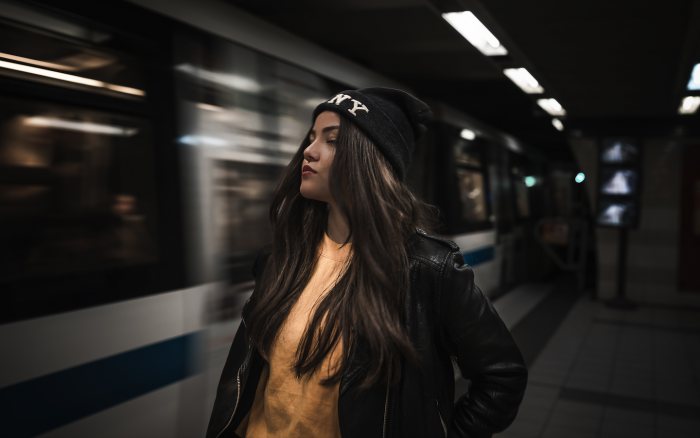The first 1,987 steps in my post-pandemic commute to New York City.
It’s 6:02 a.m. I step sleepily over the creaky floorboard as I quietly slip out of my front door.
It’s still mostly dark outside—those few moments of twilight just before dawn when the sun wakes up. Despite the weather forecast of a spring-like 65 degrees today, the morning is chilly, a reminder that winter has not quite released its grip on us.
I’m wearing my old, scratchy wool coat with the missing button, my pink, metal travel coffee cup, and car keys in hand—off to start the day.
The streets of suburbia are unusually quiet at this hour, making for a quick three-minute drive to the train station. There are only a handful of cars when I arrive, and I easily find my “regular” parking spot. It’s a strategic location making it quick to the platform and an easy escape when I return tonight after work.
The parking lot lights are still lit with their sad, buzzing fluorescence as I exit my car to wait for my train, joining the 10 other people on the quiet platform.
The train, like the street, is more crowded than it was six months ago, but empty compared to 18 months ago in our pre-pandemic lives. Pre-pandemic, I would have left at 7:30 a.m., fought some traffic, and been greeted by an almost full parking lot and packed train cars, even at such an early hour.
Now, I have a whole row to myself in the well-worn, pleather, burgundy seats. There is a smell of sanitizer and stale air from last night’s stay in the train yard. It is quiet inside; most people are sleeping, reading, or absorbed in their phones. I take that first glorious sip of my not-too-hot coffee.
The only sounds are that of the rhythmic wheels gliding over the railroad tracks, the metallic, clanking train equipment from in between the cars—a metallic lullaby for commuters. As we approach the next stations, the train announces his approach with three calm baritone blows of the horn. We pull in and pick up a few more passengers.
If there is one part of my commute that I love most, it is the tracks that run along and through the New Jersey Meadowlands, a protected animal preserve and marshland. As we travel through this area, there is an unobstructed view of the tan reeds, bright green grasses, and brackish water—Met Life Stadium and the American Dream super mall off in the distance.
Sometimes you catch a glimpse of a Snowy Egret or a Tricolored Heron diving for its morning meal.
There is something special about being on a train traveling through this peaceful preserve that helps to mentally prepare for the day ahead.
The marsh and its inhabitants are not affected by the world’s pause; in fact, maybe it has even thrived with the reduction of cars and airplanes. It’s as if Earth herself has given me a physical space for mindful meditation.
As we approach the bridge that takes us over and away from the marshy waters, the sunrise is trying to push her way up above the horizon. The sky is pink and purple—a mixture of the end of the night and today’s beginning. The fire in the sky doesn’t last long before the sun crests, dragging the new day with her.
Soon we’ll be in the historic Lackawanna Hoboken Train and Ferry station, and the day will be here, passengers will disperse. Like a herd, those of us heading to New York City follow the path to the tunnel down the stairs to the subway train. The well-traveled floor tiles are subtly laid as if they are roadways, keeping people in line and flowing. There is a distinct, rank odor of low tide and sulfur down here in the ancient tunnels.
Another train; this one is underground. There are no sights to see, simply the echo of the lonely train barreling through the dark tunnel. The high-pitched screeching of the brakes on the tracks as we round the bend or pull into a station.
Finally, I am in New York City—downtown in the Financial District, to be exact. Coming out of the train into the rebuilt World Trade Center, I am greeted by the bright, white marble. (Or is it granite? I don’t know.) It is a stark contrast from the dingy underground, and it takes my eyes a moment to adjust.
The city streets are still too quiet. Even though it is barely 7:30 a.m., there should already be a steady flow of commuters on foot and cars clogging the streets, impatiently honking horns. Being one of the hardest-hit areas in the early days of the pandemic, New York has not been the same in these months and is sleepier than before. Where I once would have passed many people walking and hurrying just like myself, now I pass only a handful of people.
There’s a chilly breeze this far south of the island. The old city buildings and granite sidewalks, potholes, and cobblestones speak nothing of the things they have seen in their yesterdays of glory and tragedy as they guide me to my destination. Ten blocks south, I walk to my building, passing only a few people. I enter the glass revolving door, so common in New York buildings, the dull, grey mat on the floor stained on the right side from countless footprints, guiding me up the escalator.
At the top, I’m greeted by the gentle bubbling of the indoor koi pond and indoor plants. It is not the Meadowlands, but it is soothing and calm. The building is dimly lit at this hour, and there is a light perfumed scent that reminds me of a hotel I used to frequent when travel was still a thing.
I walk across the lobby to the first elevator bank pressing “3,” the doors close silently, taking me to the third floor. My office suite is quiet but bright; I join only one other colleague who has also arrived early.
By this afternoon when I leave, the city will be a different world, more like its old self. It will be busier with tourists and traffic. I may not know what the post-pandemic will mean for New York, but there is a resounding confidence that it is slowly reawakening—not forever slumbered. It is not the first hardship or tragedy she has faced.
In the same way that 9/11 only made it stronger, this will too. New Yorkers are strong, resilient, stubborn, and, most of all, loyal to the city we call home. In fact, I feel this is true for all of us—not just in the United States, but for all of the world.
Just like the sunrise in the early morning chasing the night away, we will, as the people of the world, come back to greet a new day.


 Share on bsky
Share on bsky





Read 31 comments and reply